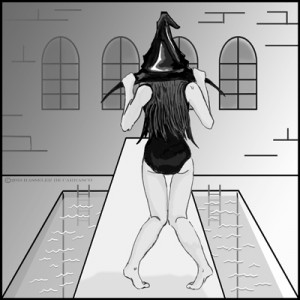 PART ONE: DROWNING IN IT
PART ONE: DROWNING IN IT
When I was a kid, I had a real fear of water. I nearly drowned in a neighbor’s aluminum pool when I was about two. My peril only lasted a second, but the experience gave me one of my first memories.
I didn’t learn how to swim until I was much older, and at some point in swimming class we had to do the unthinkable–jump off a diving board into the deep end. Want to guess how well I handled that? You got it! I froze on the board. Even amidst encouraging shouts from my much younger classmates I couldn’t jump off. Shaking and humiliated, I left the board. I could taste the fear, I could feel it hammering in my chest, twisting my stomach, and making my muscles tense like stone.
I spent a whole week struggling with that horrible feeling, that terrible dread, as each day brought me closer to the weekend and swimming class. The night before my return to the pool of doom, my mother decided it would be a great idea to watch an Ester William’s movie. Girl after girl jumped from unimaginable heights into deep dark waters. They swam under the depths. They blew bubbles. I felt every elbow-jarring movement and experienced sympathetic cramps with every thigh flutter. My stomach sank with a sickening thud down to my ankles as I was sure somebody under those miles upon crushing miles of ocean would run out of air. With dread, I waited for the blue face, the gasping mouth, the gurgle.
It was a nightmare.
I tossed and turned that night. By morning, I was pallid and numb as we made the long drive to the community center and my final plank walk. Somewhere between seeing Ester and my instructor Edie, something changed in me. I’m not sure how it happened but the first thing I did when I left the locker room was walk to the deep end, get on the board, walk to the end, plug my nose and jump. I did it. I resurfaced. I swam to the edge. And I did it again. And again.
PART TWO: THE TRUTH ABOUT FEAR
Was I cured of my fear? No. Even now, with every new adventure, it is there. This year when I truly dedicated myself to revealing my writing to others, good old Fear was there shaking its head. It thought I was nuts. I probably will never be cured of it but I’ve sort of learned my way around it, sidestepping fear cautiously, as I would a crazy aunt.
Something I have learned? Fear will not give me permission to live. Ever. I must give myself permission to live. It will tell me, “You will die if you try!” But living is dying. Quality living is dying with gusto! These truths come back to me eventually. Just jump into life. Shut down that shrill panic and do it. Sometimes, as weird as it sounds, getting out of fear can be as simple as realizing life just isn’t all that darn precious, after all. It certainly isn’t preserved in perfect and neither am I. Life is temporal, so I try to ‘seize the day’ while I have it, like a Roman.
When trying something new, like deciding to become a serious writer, I’ve found that fear often comes along for the ride. Hey, it has nothing better to do. But seriously, wouldn’t I want a better companion for the journey? Luckily I have found several, thanks to a dear coworker who knew I liked to write. She sent me a link (don’t you just LOVE angels amongst us?). It was to an audio spot NPR did on RWA’s National Convention. Within a few months of listening to it, I joined National, as well as DARA and FFP.
There is nothing that leads more directly to life changing actions than knowing one is not alone in her struggles with fear, nor is she alone when she grasps at hope and actually starts enjoying her new adventure! Plus bagels with coffee on Saturday morning just hits the right spot. Let the cultivating of courage commence!
Since joining RWA I have re-edited my epic fantasy novel (first in a series I have been working on over the years). Not only that, but I have written a completely new vampire story and submitted it to Golden Heart! I also started rewriting an old YA ghost novel and am one third of the way through a humorous space pirate romance novel with steam punk elements that I hope to put in competition by February. Yay!
FINAL NOTE:
A final note to my childhood story. At the end of that class, Edie the swimming instructor told my mother it was “sheer guts” that made me pass the final test. In other words, I had no natural talent for swimming. But I passed. In the scheme of things I will take sheer guts when natural-born skill might fail me. Imperfection passes the grade somewhere every single day. As long as I pass, I will take that and do the happy dance all over my fear.
I wish you freedom from fear in your writing, and if that doesn’t manifest–as the book says–just do it anyway. Take the jump off the deep end. You will not drown. And you will have friends to cheer you on! You will resurface from the slush pile–victorious!
This post is dedicated to my friend and coworker, Tiffany.
